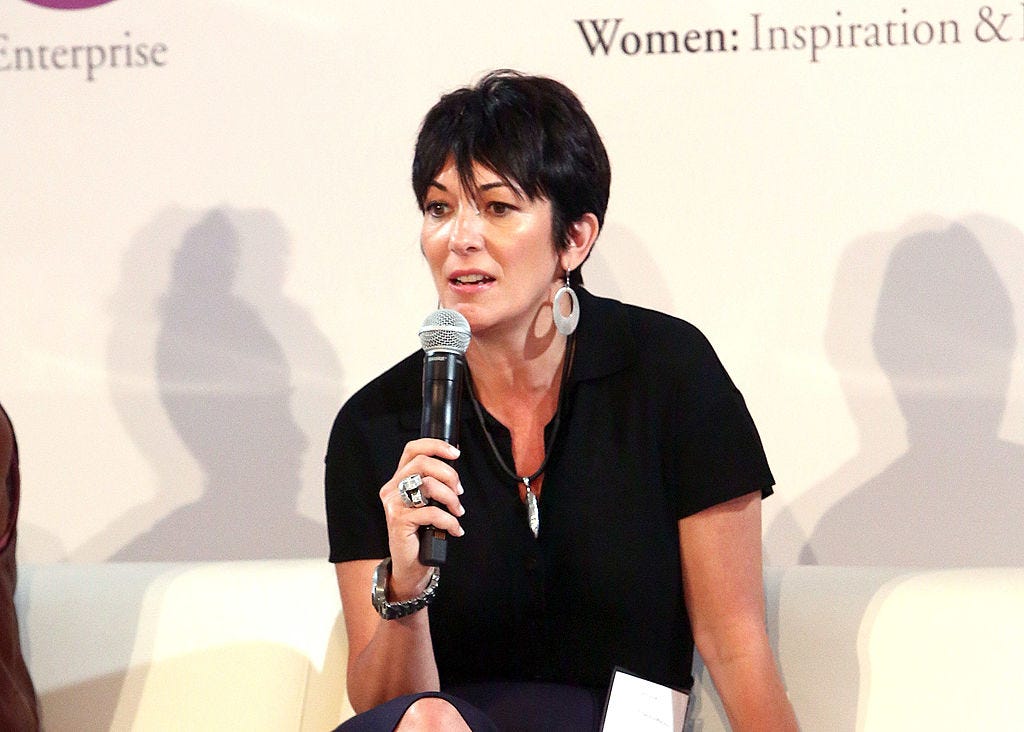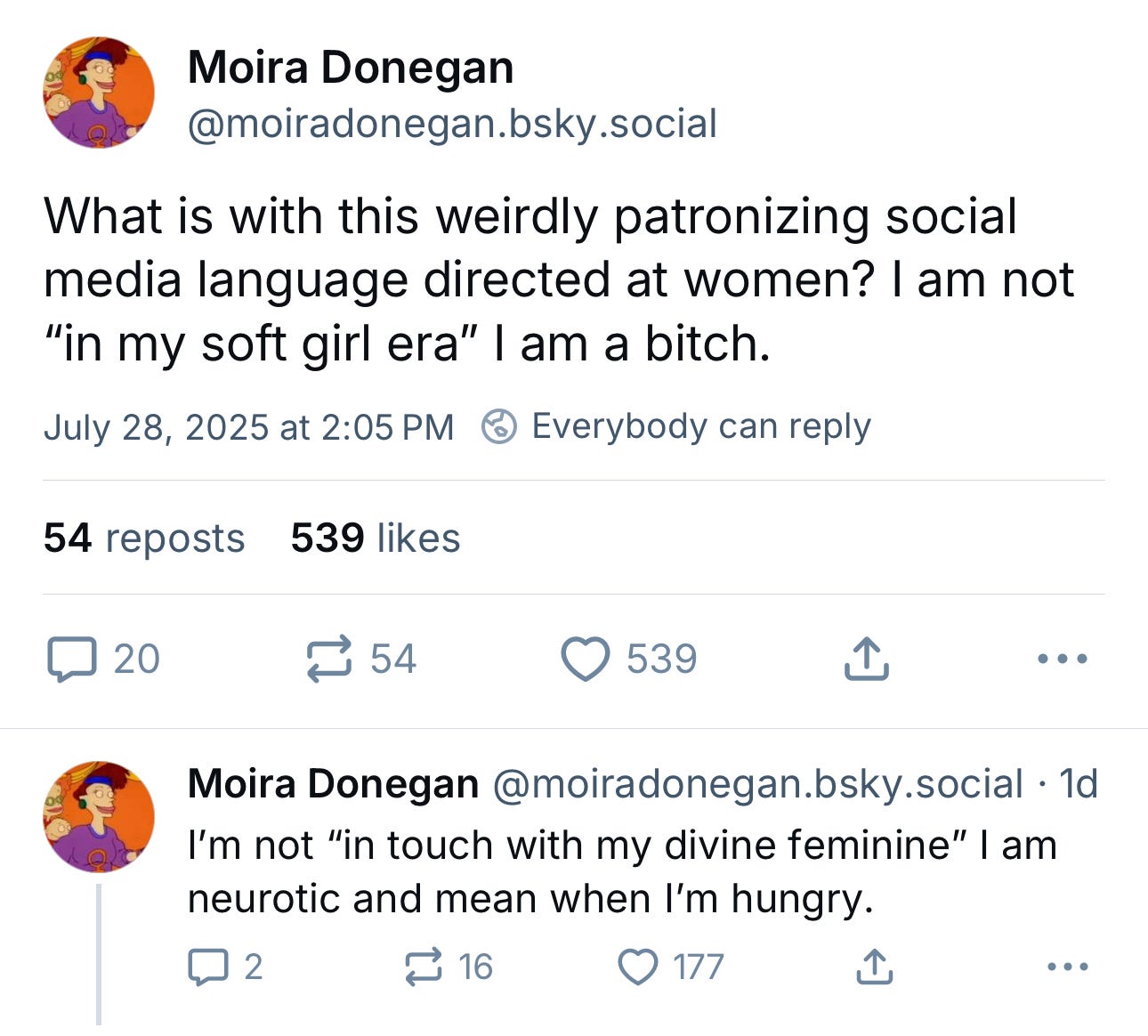This week, lawyers for convicted sex trafficker Ghislaine Maxwell, sometime girlfriend and former associate of Jeffrey Epstein, asked the Supreme Court to hear an appeal of Maxwell’s conviction. In a statement, Maxwell’s lawyer David Oscar Markus also asked President Donald Trump to pardon Maxwell, writing, "We are appealing not only to the Supreme Court but to the President himself to recognize how profoundly unjust it is to scapegoat Ghislaine Maxwell for Epstein’s crimes, especially when the government promised she would not be prosecuted."
“Scapegoat.”
Fox News interviewed a January 6 rioter who was in prison with Maxwell. That former inmate told Fox that Maxwell was a model prisoner who was kind and helpful, and who only mentioned her own case once: to state that prosecutors were not interested in her until “Jeffrey died.”
Maxwell is currently serving a 20-year sentence for her role in Epstein’s scheme to exploit and abuse minors. According to the Justice Department, Maxwell was a key part of Epstein’s plan, identifying vulnerable young girls, befriending them, putting them up in her home, and making them feel grateful. And even, in some cases, participating in the sexual abuse.
Former Palm Beach County State Attorney Dave Aronberg called Maxwell “the devil’s accomplice.”
I’m fascinated by the way Maxwell is talked about in these stories and the ways in which her legal team is leaning on sexist tropes to clear her name. In her role aiding a monster of the #MeToo Era, Maxwell embodied a particular kind of woman who uses her gender and status to become a body shield for bad men. But she’s also playing the victim now. Claiming to be nothing but a scapegoat, the Eve taking the fall for the sins of man. During her sentencing in 2022, her lawyers implied just that, stating, “Ms. Maxwell cannot and should not bear all the punishment for which Epstein should have been held responsible.”
It’s interesting to compare people’s reactions to Maxwell to the way they respond to Melania Trump. The first lady has not been convicted of any heinous crimes, but she’s also aligned herself to her husband and the work of the White House. Her entire memoir revealed nothing but pride in her husband and his work, but the cultural impulse to see her as a victim of evil men is a relentless and exhausting cultural trope. Even liberals want to whitewash Melania.
Meanwhile, Maxwell has protested her innocence and is playing the victim but has not yet attained any similar level of plausible deniability. Again, she very much was convicted, but the sort of chivalry that takes up the cause of women playing innocent has never been much concerned with a court of law.
There are a million ways of seeing Ghislaine Maxwell. Is she a scapegoat for the crimes of an evil man? An innocent model prisoner, or the devil’s accomplice? A wily criminal desperately clawing for any chance at freedom?
Maxwell is anticipated to testify under oath on Aug. 11 at or near the federal prison where she is currently serving her sentence. And yesterday, when questioned, President Trump seemed open to giving Maxwell a pardon. In an interview on the Daily Beast podcast, former Daily Beast editor Tina Brown said what a lot of political commentators are thinking: that Maxwell could be pardoned if she helps to clear Donald Trump’s name.
Going from aiding one awful man to pleading her case to another. Ghislaine Maxwell is swinging on the monkey bars of power, privilege, and patriarchy.
If you open this newsletter all the time, if you forward it to your friends and family, and if it challenges you to think in different ways, consider becoming a subscriber. I can’t make this newsletter without your support.
“Soft girl era”
The term “soft girl era” was popularized among Gen Z on TikTok and other social media platforms in 2019 as an aesthetic that embraces femininity, pastels, and a gentle, slow, flowery approach to life. Just as Gen Z began to come of age, the soft girl aesthetic was there to infantilize them.
For a generation of girls becoming women in a post-pandemic world, witnessing the collapse of any social safety net, the revocation of reproductive rights and the seething hostility of men, a retreat into girlhood makes sense.
And yet, the glorification of the soft girl life, of retreat, is also anti-feminist backlash marketed in gentle pinks and yellows. The counterweight to the trope of the angry feminist. It’s a retreat from the world of community and community-based activism to emphasize the individual need for comfort and gentleness.
A “soft girl era” is such a fragile view of femininity. It’s a femininity that is a direct result of the renewed era of toxic masculinity – men as protectors and providers.
Many online complaints about women by men involve women expecting “the princess treatment,” or having a sense of entitlement in dating. And I don’t think this is made up. I hear a lot of my cis-het friends talk about how men should open doors, or always pay, or offer to get the Uber. This expectation derives from a gendered grievance: “If I have to date men in this era, I expect to be taken care of.
I obsessively read the r/NiceGirls subreddit, where men mostly complain about the women they meet on dating apps. The majority of posts are a specific kind of complaint about women’s behavior that arises on apps or during a date, when women demand the men take them to fancy restaurants, or buy them flowers and presents. If I were a man, I would not be happy that someone approached dating me with such economic expectations. And yet, you cannot promote a view of men as protectors and providers, and expect a woman to perceive you and respect you as such, then turn around and complain when women act like widdle babies who want to be coddled.
The Tea App
Even in a time of anti-feminist backlash, Facebook Groups like “Are We Dating the Same Man?” where women compare notes about the violent and/or just crappy men they’ve dated still remain a powerful voice in local communities.
App developers took that need for a woman’s whisper network and made the Tea App. The app claims to have 1.6 million members and aims to create a space for women to exchange information about men in order to stay safe.
This week, the app was hacked by members of 4chan who leaked information about the app’s users online.
So, an app was created for women to safely share information about dangerous men and then that app was hacked by men and the safety of these women was put at risk. It’s a perfect microcosm of gender dynamics in America today.
Other thoughts
“I’ve been very vocal about the genocide of a generation of women by the cosmeceutical industrial complex,” Jamie Lee Curtis told The Guardian in a recently published interview. “I’ve used that word for a long time and I use it specifically because it’s a strong word. I believe that we have wiped out a generation or two of natural human (appearance).” (via CNN)
The
podcast has some thoughts on the recent Republican conference for women.Why do people accuse powerful women of secretly being men? (via The 19th)




Ghislaine Maxwell is not a scapegoat. As one of the lawyers for some Epstein victims pointed out, she was a crucial part of the scheme to lure girls to his place. She literally used a cute dog to meet eighth graders at a park! Many of the girls would have been reluctant to go along with some middle aged man who approached them, but she seemed elegant and trustworthy.
Sorry, not sorry. Fuck cis-het men. They don't want women to expect to be taken care of, but then when a woman needs nothing (because I own my own house, my kids are grown, and I pay my own bills, thanks much) but good companionship and good sex they're like, "I need to be needed." FFS.